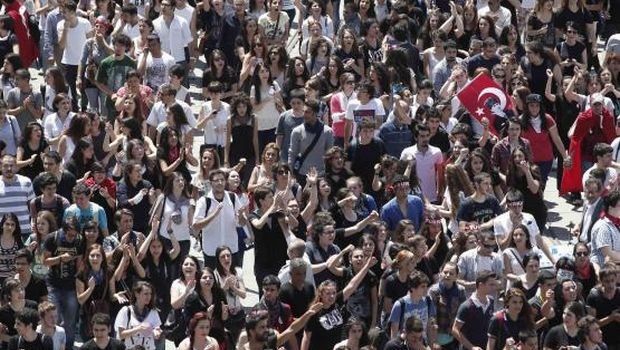Syrian state-run media outlets, and other loyal news agencies, were awash with funny comparisons during their coverage of the protests in Turkey. They described the use of water cannons and tear gas by Turkish security forces as being “brutal.” How terrible water must appear, compared with sarin gas, bombs and Scud missiles deployed by the Syrian regime.
But, apart from this light hearted comparison, the protests at Taksim Square merit analysis from different points of view, including the role of media and journalism throughout the events.
While the famous Taksim Square in downtown Istanbul was full of angry protesters, the best-known news channels in the country were busy covering other topics. One broadcast a documentary about penguins, whilst another broadcast cooking shows.
The Turkish media helped turning the protests in Taksim Square into a global event. It did so not by broadcasting the events, but by ignoring them. Turkish protests made headlines on main CNN networks, but CNN Turk broadcast a documentary on penguins. Penguins have since then become a symbol of the scandal of Turkish media, and a joke that circulates amongst Turks.
It seems that, during his ten-year rule, Prime Minister Recep Tayyip Erdoğan has successfully incorporated private media channels into the network of his economic interests. He has made them submissive to a group of companies that are part of the ruling Justice and Development Party’s economy.
The Taksim uprising is, in one aspect, one against Erdoğan’s efforts to discipline media figures, after he succeeded in making such institutions submissive. In the past, he requested media outlets to discipline their journalists, and the organizations obliged. He has also taken legal action against a number of other journalists.
At the height of the protests at Taksim, he culminated this tendency by saying that social media is the worst menace to society. The truth is that, when traditional media failed to fulfil its duties, social media did the job. It is identical to what happened at Tahrir Square in Egypt. Turkish Twitter activity became a phenomenon as, on one night, 3,000 tweets were sent per minute.
Erdogan’s statement that social media is a menace indicates that controlling traditional visual, audio and print media is no longer enough to prevent events from being covered. As the world’s media broadcast developments to the world, the Turks in Taksim resorted to Twitter and Facebook to ensure coverage of the domestic public opinion. In the confrontation between social and traditional media, the latter lost. They have admitted to this, and apologized for their shortcomings. However, this in itself is meaningless, since the discussion that preceded the media downfall had exposed the private media interests of the government-sponsored networks.
Activists and protesters launched huge campaigns in Turkey to punish media outlets for their failings, calling for them to be boycotted. They took it upon themselves to cover the developments of their activities after they felt that traditional media betrayed their cause.
Some Arabs rejoiced with the protests in Taksim, considering it the first time for an Arab soap opera to be dubbed in Turkish. Let us hope this is an inaccurate comparison, so Turkey does not end up in the same situation as the rest of the Middle East.
